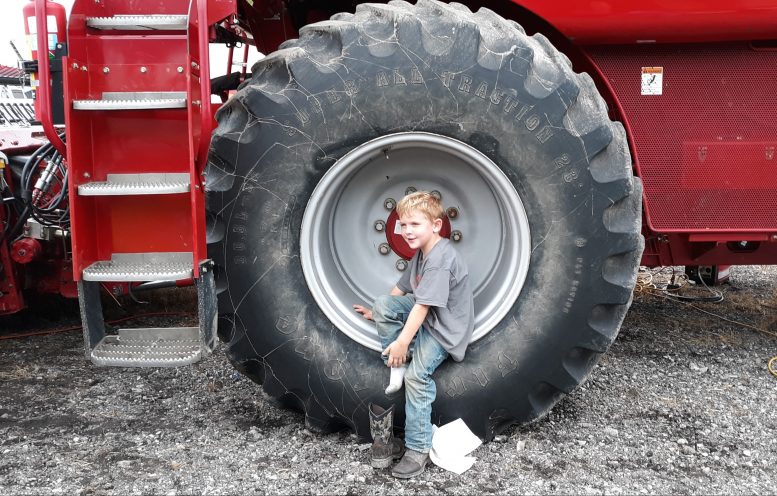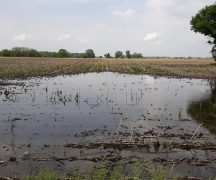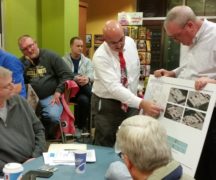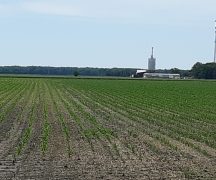By JAN LARSON McLAUGHLIN
BG Independent News
Farming is more than a profession for Fred Vetter.
“The dirt you’re standing on – my grandpa bought in 1912,” Vetter said as he looked over his Mercer Road farm north of Bowling Green on Saturday afternoon.
Vetter’s farm was one of seven stops on the Wood County “Ag-Venture” self-driving farm tours on Saturday.
Like others on the tour route, Vetter wanted local residents to see farms as more than just some fields along country roads.
“Everybody drives down the road and they see us,” he said. But most Wood County residents know little of what it takes to farm the land.
“We need to educate people,” Vetter said. “That we’re trying to be good stewards.”
The “ag-venture” tours took visitors to traditional farms, like the Vetters, Moser Farms on Hull Prairie Road, and Black Swamp Ag on Portage Road. It also led visitors to more unconventional farms like Schooner Farms on Otsego Pike, and to agri-businesses like Pioneer Seed, Luckey Farmers and Hirzel Canning.
This was the first time for a county-wide tour to be organized, said Julie Lause, of the Wood Soil & Water Conservation District, which was one of the sponsors.
“Agriculture in Wood County is the top business and people don’t realize how extensive agriculture can be,” she said. “They don’t realize what it takes to create the products we eat.”
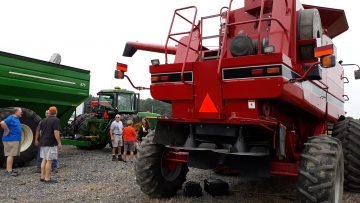
Combine on the Vetter farm
For soybean, wheat and corn farming it takes equipment that can costs more than many homes. Vetter’s 2003 combine cost about $140,000. Nowadays, with all the tech gadgets, a combine can cost as much as $500,000.
It’s standard for equipment to have self-steering GPS, and tires taller than many of those visiting the farms. Fields have to have drainage – especially on this land that was once swamp. And drones help identify problem areas of disease or pests before they spread too far.
“It takes a lot of money to farm,” said Vetter, whose sons Shane and Garett, have joined him in agriculture.
Even when the best seed is purchased, planted on time, and fertilized – the outcome is still in the hands of Mother Nature. Long periods of rainy or dry weather, at the wrong times, can greatly impact the harvest. Aphids can devour otherwise healthy plants.
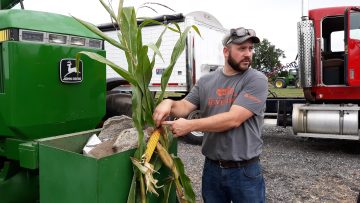
Shane Vetter shows corn stalks.
“You can work as hard as you can,” Shane Vetter said. “Mother Nature is in charge, no matter what.”
And then on top of everything else, there’s politics.
“The tariffs are touching us,” Fred Vetter said of his soybeans and corn crops. “I’m not saying we won’t be OK. But we’re feeling it.”
Elsewhere on the “ag-venture” tours was the less traditional Schooner Farms near Weston.
“We do a little different farming than they’re going to see at other farms,” Don Schooner said.
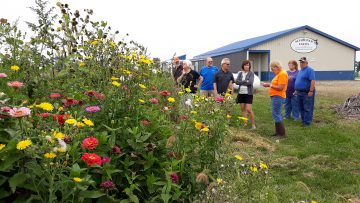
Visitors view the mound farming at Schooner Farms.
Rather than being production-based, Schooner’s farm is education-based. It features pick-your-own raspberries, blackberries and strawberries. There are bees making honey, a maze of lavender, fish cleaning organic sustainable ponds, and even freshwater lobsters.
The farm uses the gardening technique of hugelkultur – mound gardening.
“If they learn that type of gardening, it’s worth the visit,” Schooner said. “If they learn that type of farming, they can do it at their own home.”
Becky White Schooner described the farm as the “oddball” on the tour.
“It think it’s good to bring awareness,” she said. “There’s a lot of different agriculture out there. This you can do in your own garden.”
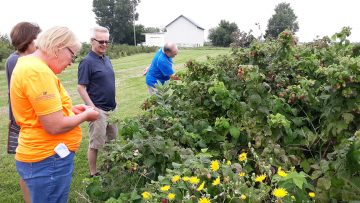
You-pick raspberries at Schooner Farms
On the north end of the driving tour was Hirzel Canning in Northwood. Smells quickly revealed to visitors that stewed tomatoes were on Saturday’s schedule.
The Hirzel family came to the U.S. in 1923 with plans to bring their beer brewing skills from Switzerland. However, politics got in the way with Prohibition – and the family switched over to producing sauerkraut and tomato products.
The canning business expanded from the family’s basement to a plant next door that has grown to about 400,000 square feet. The business has expanded by adding a plant in Pemberville in 1954 and another in Ottawa in 1984.
Hirzels buys tomatoes from more than 30 local growers, all within 50 miles of the canning facilities. Care is taken to can the tomatoes the same day they are harvested, Jessica Hirzel said.
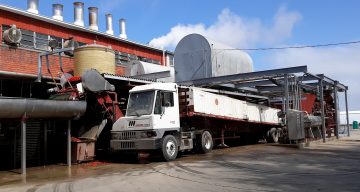
Tomatoes are unloaded at Hirzel Canning.
Visitors touring the canning operation on Saturday saw tomatoes being unloaded from semi-trucks, washed repeatedly, placed in cans on conveyor belts, being steamed inside the cans, then labeled for customers.
The plant can handle 500 tons of tomatoes a day, filling about 200,000 cans. This is the busy fresh tomato time for the plant. Later will come the salsas and pasta sauces.
“That’s in the winter time, when we’re not buried under fresh tomatoes,” Hirzel said.
The cabbage is turned into sauerkraut before and after the busy tomato time.
The canning plant has 45 full-time year-round employees. Another 40 seasonal workers are added for summer. With the tight labor market, it is difficult to find enough part-time workers for just one shift, Hirzel said.
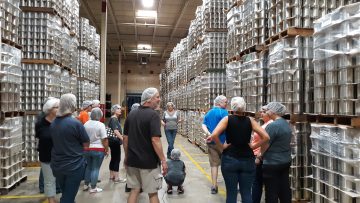
Visitors view full cans of tomato products.
The business that started out with sauerkraut in the Hirzel’s basement, now provides products to local stores like Kroger, Monnette’s, Sautter’s, Kazmaier’s, House of Meats, Frobose Market, Zavokski Meats, Walmart, Meijer and Churchill’s.
There are more than 1,000 farms in Wood County. Here’s how they rank with the rest of Ohio’s counties:
- 1st in value of grain sold.
- 5th for soybean crops planted.
- 6th in total value of agricultural products sold.
- 8th in total value of vegetables sold.
- 13th in total value of greenhouse sales.
- 17th in total value of aquaculture sales.
- 181st in the U.S. for total grain value.

